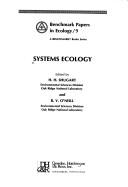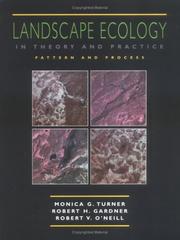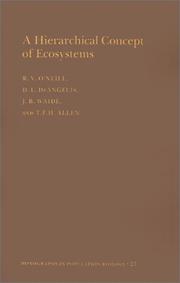| Listing 1 - 7 of 7 |
Sort by
|

ISBN: 0879333472 Year: 1979 Publisher: Stroudsburg Dowden, Hutchinson and Ross
Abstract | Keywords | Export | Availability | Bookmark
 Loading...
Loading...Choose an application
- Reference Manager
- EndNote
- RefWorks (Direct export to RefWorks)
General ecology and biosociology --- Ecology --- -XXX --- --- Balance of nature --- Biology --- Bionomics --- Ecological processes --- Ecological science --- Ecological sciences --- Environment --- Environmental biology --- Oecology --- Environmental sciences --- Population biology --- Mathematical models --- Mathematical models. --- XXX

ISBN: 0387951237 0387951229 9786610187393 1280187395 0387216944 9780387951232 9780387951225 Year: 2001 Publisher: New York, NY : Springer New York : Imprint: Springer,
Abstract | Keywords | Export | Availability | Bookmark
 Loading...
Loading...Choose an application
- Reference Manager
- EndNote
- RefWorks (Direct export to RefWorks)
Landscape ecology is not a distinct discipline or simply a branch of ecology, but rather is the synthetic intersection of many related disciplines that focus on the spatial-temporal pattern of the landscape. Risser et al. , 1984 The emergence of landscape ecology as a discipline has catalyzed a shift in paradigms among ecologists, . . . resource managers and land-use planners. Having now seen the faces of spatial pattern and scale . . . we can never go back to the old ways of viewing things. Wiens, 1999 his book presents the perspective of three ecologists on the concepts and Tapplications of landscape ecology, a discipline that has shown expansive growth during the past two decades. Although landscape ecology is a multidis- plinary subject involving components as diverse as economics and sociology, the earth sciences and geography, remote sensing and computer applications, we - cus here on what ecologists need to know about landscapes. Landscape ecology served as the integrating theme of our collaborative research for nearly 15 years, including a 7-year period during which we worked together at Oak Ridge National Laboratory. We became acquainted in January 1986 at the first annual United States Landscape Ecology symposium held at the Univ- sity of Georgia and organized by Monica Turner and Frank Golley. Landscape ecology was, at that time, a new subject in the United States. The first U. S.
Environmental planning --- General ecology and biosociology --- Landscape ecology. --- Environmental Sciences and Forestry. Ecology --- Landscape Ecology. --- Landscape ecology --- Earth & Environmental Sciences --- Ecology --- 504.54 --- 574 --- 574 General ecology. Biocoenology. Hydrobiology. Biogeography --- General ecology. Biocoenology. Hydrobiology. Biogeography --- 504.54 Landscape. Landscape ecology --- Landscape. Landscape ecology --- Ecologie du paysage --- EPUB-LIV-FT SPRINGER-B --- Environment. --- Regional planning. --- Urban planning. --- Ecology. --- Applied ecology. --- Ecosystems. --- Environmental management. --- Environmental Management. --- Applied Ecology. --- Landscape/Regional and Urban Planning. --- Endangered ecosystems. --- Ecology . --- Cities and towns --- City planning --- Civic planning --- Land use, Urban --- Model cities --- Redevelopment, Urban --- Slum clearance --- Town planning --- Urban design --- Urban development --- Urban planning --- Land use --- Planning --- Art, Municipal --- Civic improvement --- Regional planning --- Urban policy --- Urban renewal --- Regional development --- State planning --- Human settlements --- Landscape protection --- Biocenoses --- Biocoenoses --- Biogeoecology --- Biological communities --- Biomes --- Biotic community ecology --- Communities, Biotic --- Community ecology, Biotic --- Ecological communities --- Ecosystems --- Natural communities --- Population biology --- Environmental protection --- Nature conservation --- Balance of nature --- Biology --- Bionomics --- Ecological processes --- Ecological science --- Ecological sciences --- Environment --- Environmental biology --- Oecology --- Environmental sciences --- Environmental stewardship --- Stewardship, Environmental --- Management --- Government policy --- Landscape --- land use --- ecosystems --- ecological succession --- ecology --- Land use planning --- design --- Models --- Environmental policies

ISBN: 0691084378 069108436X Year: 1986 Publisher: Princeton, N.J.
Abstract | Keywords | Export | Availability | Bookmark
 Loading...
Loading...Choose an application
- Reference Manager
- EndNote
- RefWorks (Direct export to RefWorks)
"Ecosystem" is an intuitively appealing concept to most ecologists, but, in spite of its widespread use, the term remains diffuse and ambiguous. The authors of this book argue that previous attempts to define the concept have been derived from particular viewpoints to the exclusion of others equally possible. They offer instead a more general line of thought based on hierarchy theory. Their contribution should help to counteract the present separation of subdisciplines in ecology and to bring functional and population/community ecologists closer to a common approach. Developed as a way of understanding highly complex organized systems, hierarchy theory has at its center the idea that organization results from differences in process rates. To the authors the theory suggests an objective way of decomposing ecosystems into their component parts. The results thus obtained offer a rewarding method for integrating various schools of ecology.
General ecology and biosociology --- Biotic communities. --- Ecology.
Book
ISBN: 0873711637 Year: 1992 Publisher: Chelsea (Mich.) : Lewis,
Abstract | Keywords | Export | Availability | Bookmark
 Loading...
Loading...Choose an application
- Reference Manager
- EndNote
- RefWorks (Direct export to RefWorks)
Book
ISBN: 9780691236605 Year: 2021 Publisher: Princeton, NJ
Abstract | Keywords | Export | Availability | Bookmark
 Loading...
Loading...Choose an application
- Reference Manager
- EndNote
- RefWorks (Direct export to RefWorks)
Article
Abstract | Keywords | Export | Availability | Bookmark
 Loading...
Loading...Choose an application
- Reference Manager
- EndNote
- RefWorks (Direct export to RefWorks)
Article
Abstract | Keywords | Export | Availability | Bookmark
 Loading...
Loading...Choose an application
- Reference Manager
- EndNote
- RefWorks (Direct export to RefWorks)
| Listing 1 - 7 of 7 |
Sort by
|

 Search
Search Feedback
Feedback About UniCat
About UniCat  Help
Help News
News